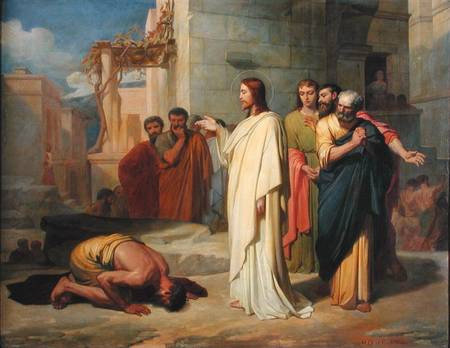
The readings for Friday, April 2, can be found on the USCCB website here.
- Is 52:13-53:12
- Ps 31
- Heb 4:14-16; 5:7-9
- Jn 18:1-19:42
They put him to death by torturing him and crucifying him. It was a cruel and public killing intended to humiliate and shame not only Jesus but his followers. It was not quick. The beating, carrying of the cross, hanging, and gradual death by exhaustion and asphyxiation took hours.
There is a lot in these readings. As I use my imagination to reflect on John’s account, it is the figure of Simon Peter who struck me today as worthy of particular attention, even before we get to the cross.
“You are not also one of this man’s disciples, are you?”
He said “I am not.” (18:17)
“You are not also one of his disciples, are you?”
He denied it and said “I am not.” (18:25)
“Did I not see you in the garden with him?”
Again Peter denied it, and at that moment the cock crowed. (18:26b-27)
This week, the trial of Derek Chauvin for the murder of George Floyd began. Witnessing the death of Floyd—nine minutes and twenty nine seconds of Officer Chauvin kneeling on Floyd’s neck—is hard for me. Like Peter, I turn away.
A 65-year old Filipina woman in New York City was brutally attacked in broad daylight by a man who told her “You don’t belong here” while security guards inside the building close the door and refuse her aid. Like Peter, they turn away.
A humanitarian crisis continues on our Southern border with Mexico, as border facilities are overcrowded and the processing of asylum seekers is painfully slow. Do we, like Peter, turn away?
I’m struck today by how indifference to the suffering of others, or fear to get involved, is such a pattern we see repeated time and time again.[1] How many times have I told myself that I’d be like one of the faithful women at the foot of the cross, when in my daily reality I refuse opportunities for bystander intervention? I cannot know Peter’s motivations. I assume he was frightened, afraid for his own life, “guilty by association” with Jesus. Maybe he was confused, doubting about whether to believe everything Jesus had said and done. All of that is too hard to explain. Instead, he says, “I am not.”
In the Confiteor, we confess our sins together in community—both “what I have done and what I have failed to do.”
Let this Good Friday be a time in which we recognize the harm of our inaction.
As we follow the story from Peter’s denials to Golgotha, we are led to the cross. As we reflect on the cross, there are no easy answers to what we see as pervasive and ongoing threats of violence and suffering. We don’t crucify people anymore. Today we use other methods to kill. Easy access to military-grade weapons, a death penalty imposed disproportionately, slow deaths from lack of access to clean water and sanitation, social sins of poverty, racism, consumerism, and homophobia.
Some theologians will say that unmerited suffering does not bring redemption. Salvation comes from union with God, not acceptance of suffering. This is an appropriate caution, for we need to be reminded not to glorify suffering for its own sake.[2]
But for people who are suffering, there can be power in recognizing that Jesus, too, knows what that feels like. The cross confirms the reality of the incarnation—Jesus was fully human, so Jesus experienced suffering and death. But it is more than that. Some find transcendent meaning—purpose—in that suffering, such that suffering itself can creatively transform us towards love and help us to become closer to God. James H. Cone, in describing the soteriology of Martin Luther King Jr, explains that for King, “the cross represented the depth of God’s love for suffering humanity, and an answer to the deadly cycle of violence and hatred.”[3] King’s perspective was shaped by reading the Bible through the black community’s experience of segregation, Jim Crow, lynching, and voter suppression. In Cone’s words: “When King thought about Jesus hanging on the shameful cross, he also saw God transform a tragic situation into something redemptive.”[4]
There are many ways to interpret the cross, and at different stages of one’s life different interpretations will be more or less meaningful. Good Friday is a time to sit with the reality of suffering and ask ourselves big questions, knowing that the God we worship is big enough to hold our questions, even if we will never know all of the answers.
[1] For those interested in further reflection, see Pope Francis, Fratelli Tutti, chapter 2, which provides and extended reflection on the Good Samaritan and the importance of bystander intervention.
[2] Delores Williams, a womanist scholar, is an example of someone who challenges traditional soteriology; so too are liberation theologians who advocate taking suffering people down from their crosses (see Jon Sobrino).
[3] Cone, The Cross and the Lynching Tree, 85.
[4] Cone, 86.



